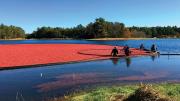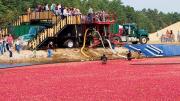Long before cranberries were corralled and canned to zest up roasted turkeys, Native Americans used the indigenous North American fruit for food, medicine, and dyes. European settlers followed suit, yet it was not until 1816 that wild cranberries were cultivated with an eye toward commercial use by Captain Henry Hall, of Dennis, Massachusetts. Today, the fruit is the state’s top agricultural food product. Some 13,500 acres of bogs in the southeast region and on Cape Cod produced about 2.2 million barrels of berries in 2015—roughly 22 percent of the world’s supply.
The kid-friendly Cranberry Harvest Celebration (October 8-9) honors this edible symbol of regional pride, and the pains taken to grow and harvest it locally. The finicky vines like careful shielding from extreme temperatures, acidic peat soil, and plenty of fresh water (at just the right moments), along with a homey mix of clay, sand, and gravel—conditions that originally developed naturally in “bogs” produced by glaciers 10,000 years ago. Once ripe, about 10 percent of the local berries are plucked mechanically from dry vines; the rest are “wet-harvested” from flooded bogs. Festival-goers gather at scenic Tihonet Pond, then walk or ride a hay wagon to the bogs of the A.D. Makepeace Company to watch machines whisk the water to loosen berries, which then float to the surface, creating massive pools of bobbing red balls.
There are also paddleboat and pony rides back by the pond, along with plenty of craft-making booths, live music, cooking demonstrations, and food vendors.










